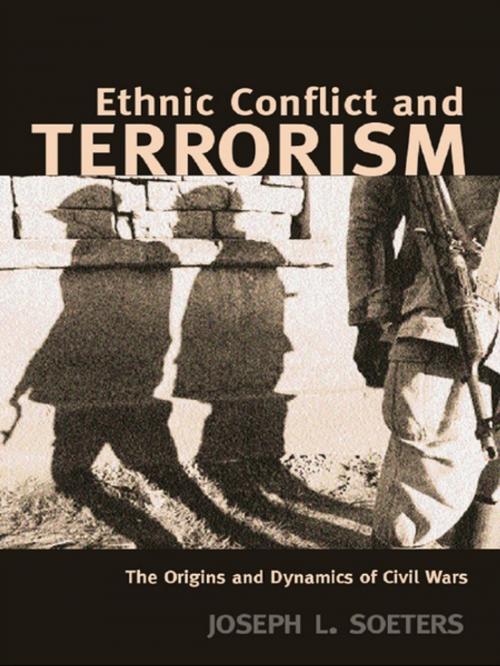Ethnic Conflict and Terrorism
The Origins and Dynamics of Civil Wars
Nonfiction, Social & Cultural Studies, Political Science, International, International Security, International Relations| Author: | Joseph L. Soeters | ISBN: | 9781134213818 |
| Publisher: | Taylor and Francis | Publication: | November 16, 2005 |
| Imprint: | Routledge | Language: | English |
| Author: | Joseph L. Soeters |
| ISBN: | 9781134213818 |
| Publisher: | Taylor and Francis |
| Publication: | November 16, 2005 |
| Imprint: | Routledge |
| Language: | English |
In the early 1990s a number of violent civil wars and large-scale ethnic crises shocked the world. In Rwanda, Bosnia, Chechnya and elsewhere atrocities were committed that led to hundreds of thousands of dead and displaced people.
Explaining the origins and dynamics of such inhuman actions and events, this new sensitive and detailed analysis includes:
- full analysis of the origins of civil wars, terrorism and ethnic strife
- insights drawn from across the social sciences
- practical and topical illustrations of the information provided
- fully updated assessments with details of key contemporary events
Although the number of these conflicts has diminished over the years, the phenomenon has not disappeared: in the Sudan, the Congo, Sierra Leone, Liberia, Nigeria, Afghanistan and Iraq people are still being killed in large numbers, without authorities being able to avert or end the hostilities. On nine-eleven large-scale terrorist attacks in Washington and New York shocked the world again, and since then other violent events took place in Bali, Casablanca, Riyadh, Moscow, Istanbul and Madrid.
This book of concern to all people, because recent history has shown us that such violence can strike everywhere and at any time. The final chapter delivers a number of constructive considerations aiming at the development of policies to prevent and stop such conflicts. This is an important new contribution to tackling the complex challenges of the twenty first century.
This book will be of great interest to all students and scholars of contemporary history, development studies, political and social sciences and International Relations.
In the early 1990s a number of violent civil wars and large-scale ethnic crises shocked the world. In Rwanda, Bosnia, Chechnya and elsewhere atrocities were committed that led to hundreds of thousands of dead and displaced people.
Explaining the origins and dynamics of such inhuman actions and events, this new sensitive and detailed analysis includes:
- full analysis of the origins of civil wars, terrorism and ethnic strife
- insights drawn from across the social sciences
- practical and topical illustrations of the information provided
- fully updated assessments with details of key contemporary events
Although the number of these conflicts has diminished over the years, the phenomenon has not disappeared: in the Sudan, the Congo, Sierra Leone, Liberia, Nigeria, Afghanistan and Iraq people are still being killed in large numbers, without authorities being able to avert or end the hostilities. On nine-eleven large-scale terrorist attacks in Washington and New York shocked the world again, and since then other violent events took place in Bali, Casablanca, Riyadh, Moscow, Istanbul and Madrid.
This book of concern to all people, because recent history has shown us that such violence can strike everywhere and at any time. The final chapter delivers a number of constructive considerations aiming at the development of policies to prevent and stop such conflicts. This is an important new contribution to tackling the complex challenges of the twenty first century.
This book will be of great interest to all students and scholars of contemporary history, development studies, political and social sciences and International Relations.















